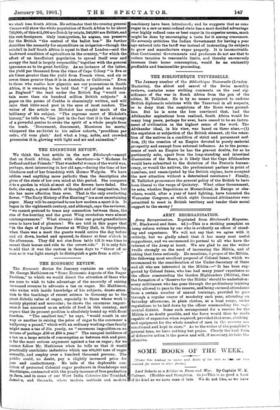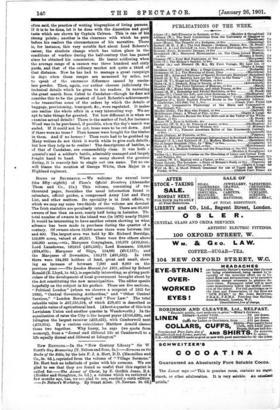SOME BOOKS OF THE WEEK.
I-Under this heading notice such Books of the luck as 1.41Ne not 6een
reserved for reviete in other forms.]
often said, the practice of writing biographies of living persons. If it is to be done, let it be done with the discretion and good taste which are shown by Captain Cairnes. This is one of his strong points ; another is the clearness with which he puts before his readers the circumstances of his narrative. There is, for instance, this very notable fact about Lord Roberts's career, the absolute change which has taken place in the conditions of warfare during the half-century that has passed since he obtained his commission. He learnt soldiering when the average range of a cannon was three hundred and sixty yards, and that of the ordinary musket not quite a third of that distance. Now he has hai to manage a great campaign in days when these ranges are measured by miles, not to speak of the enormous difference caused by smoke- less powder. Then, again, our author chooses judiciously the technical details which he gives to his readers. In narrating the great march from Cabul to Candahar—though he does not consider this to be the greatest of Lord Roberts's achievements —he transcribes some of the orders by which the details of baggage, provisioning, transport, &c., were regulated. It makes one realise the whole affair in a very interesting way. We are apt to take things for granted. Yet how different it is when we examine actual details ! There is the matter of fuel, for instance Wood was to be purchased, if possible, when the day's march was ended. If it could not be got, trees were to be cut down. And if there were no trees ? Then houses were bought for the timbei in them. And if no houses ? Then roots had to be grubbed up Many writers do not think it worth while to give such details but how they help us to realise! The descriptions of battles, as of that of Candahar, are commendably clear. It was both a general's and a soldier's battle, admirably managed and large].) fought hand to hand. When so many showed the greatest daring, it is scarcely fair to single out one name. Yet no one will blame the mention of George White, then Major in a Highland regiment.



















































 Previous page
Previous page